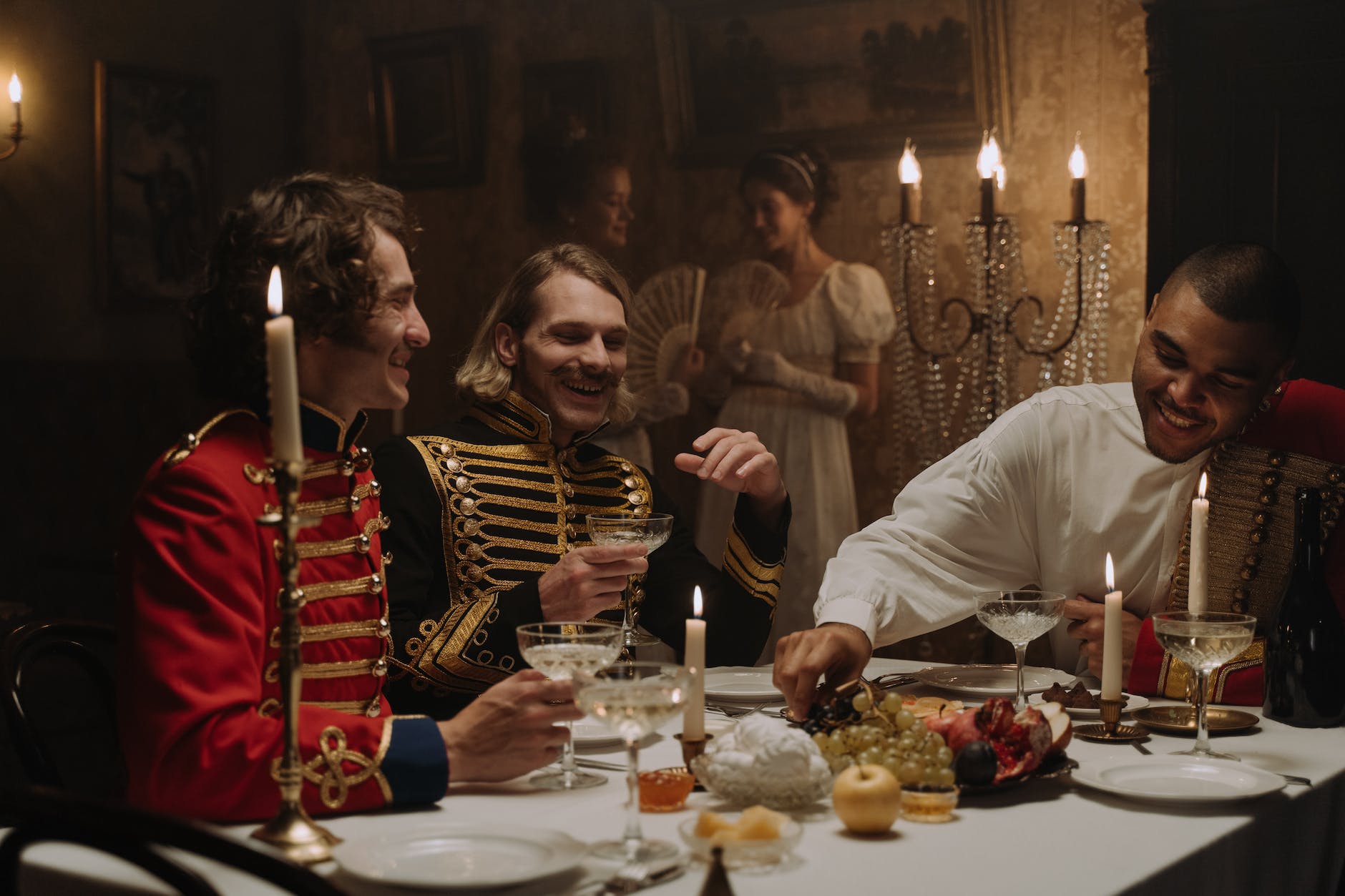How can you prevent your players from causing issues with the NPCs during Non-Combat Scene? This is a common concern among gamemasters. Players often tend to misbehave in these situations, such as when a mage conspicuously casts spells to impress a court wizard, a barbarian scratches or belches loudly, or a thief contemplates mischief in the king’s courtroom. After all, it’s a role-playing game, and players should have the freedom to do as they please, right? However, what if such behavior hinders the story’s progress? This article aims to assist gamemasters in managing non-combat scenes more smoothly.

Why Include Non-Combat Scenes in RPGs?
The first question you should ask yourself as a gamemaster is, “What do I aim to achieve with this scene?” Many gamemasters, including myself until a few years ago, overlook this question. Have you ever watched a poorly edited film where certain scenes seem entirely irrelevant? Why was it crucial for the characters to visit a corner store and buy milk in the middle of the movie? In a role-playing game, every moment should hold significance. It could be as straightforward as wanting players to delve deeper into their characters or providing them with an opportunity to be suspicious of an NPC Mage secretly working for the Dark King. The crucial aspect for a GM is to know the reason behind the Non-Combat Scene. You can choose to share this reason with your players or keep it a secret. If you can’t come up with a compelling reason, it might be wise to skip that part of the game.
Setting Expectations with Your RPG Party
It may not be obvious, but in the “Zapperburger Episode” of Star-Fall, I informed The Fifth Crew about my expectations. They entered the game understanding that they were in a non-combat scenario and should avoid causing any disruptions. The result was just as enjoyable as the players used the fast-food restaurant setting to explore their characters further.
While the exact mission goals might be obscured, the key to success lies in conveying that they should avoid causing trouble while searching for something.
Keeping Pranksters and Murderhobos Satisfied While Others Roleplay in the Non-Combat Scene
Thieves, pranksters, and murderhobos often pose challenges in such scenes. One technique I employ is allowing a knowledge roll with a substantial bonus “due to their expertise.” If they roll even moderately well (did I mention a significant bonus to the dice roll), you can inform the player that their character is clever enough to refrain from causing issues in this situation. You can find various reasons for the character to exercise caution. By making it the character’s decision (and something that reflects positively on their expertise), players are less likely to disrupt the scene in the king’s court.
Keeping Thieves in Check
You notice that the King has placed an alarm spell on everything; only an amateur would attempt to steal anything from this room.
You spot some “Thieves Cant” writing, warning you that stealing anything is a trap, and the real treasures are hidden elsewhere.
You recognize your former mentor working as a consultant for the king, and they signal you to “back off” with the promise of future communication.
Dissuading Murderhobos
You identify a hidden guard ready to take you down if you get too close.
You recognize one of the guards; you’ve witnessed their combat prowess, and you know you’re no match for them.
Deterring Pranksters
You realize this is the one occasion to behave appropriately.
Before entering the room, you overhear the guards discussing the consequences faced by the last person who played a prank in this room.
The King is aware of your pranks and mentions it; it’s best to be on your best behavior here.
Using Consequences to Guide Player Characters
Expanding on the examples above, being creative in devising consequences is an effective way to maintain control over mischievous players. Personally, I don’t believe in punishing players, as it can foster an unhealthy mindset. Instead, I favor “natural consequences,” where actions logically lead to outcomes. For instance, attempting to steal from the King could lead to facing a hangman’s noose. It’s crucial to provide ample warnings to prevent characters from making foolish decisions. However, if they persist despite multiple warnings, it doesn’t mean they have to die; they might find themselves spending time in a dungeon until the bard can persuade the King to release them.
Using Rewards to Encourage Compliance
Understanding your players’ motivations is essential. Knowing that a social interaction will result in tangible benefits can motivate players to behave appropriately. This doesn’t mean you should let a barbarian with a Charisma score of 4 handle all negotiations. However, informing the thief that having the King as an important patron outweighs any potential loot from the throne room can keep pranksters in check. Informing players in advance of the advantages of a successful social interaction or at least avoiding a failed one can deter disruptive behavior.
Listening to Your Players, Because It’s About Them
Sometimes, as a gamemaster, you might have a brilliant idea, but the players may not find it enjoyable. I once attempted to run a heavily political module for my friend’s 10-year-old son and his friends, all of whom had names like Wolf Shadow, Blood Shadow, Shadow Blood Wolf, and headbands with swords – a mismatch for such a game. Non-Combat Scene was never going to happen.
Your primary responsibility as a gamemaster is to ensure your players have fun. Therefore, it’s essential to understand what they want to do. If you have a group of murderhobos, then provide them with a game that suits their preferences. Asking players about the type of game they want doesn’t limit your creativity; instead, it aligns expectations for the game. I personally seek players who fit the game I want to run, but if they’re already at my table, it’s my responsibility to ensure everyone has a good time.
- Top 10 Cooperative Board Games for Team PlayersCooperative board games are the ultimate way to foster teamwork, strategy, and camaraderie. Instead of competing against each other, players band together to overcome… Read more: Top 10 Cooperative Board Games for Team Players
- Exploring the World of Card Games: From Magic: The Gathering to MunchkinCard games are a fantastic way to bring people together, challenge your strategic thinking, and dive into imaginative worlds. Whether you’re a fantasy enthusiast,… Read more: Exploring the World of Card Games: From Magic: The Gathering to Munchkin
- Cards Against Humanity: The Party Game for Horrible PeopleLooking for a hilarious, irreverent party game to liven up your next gathering? Cards Against Humanity is the ultimate icebreaker and a guaranteed source of belly… Read more: Cards Against Humanity: The Party Game for Horrible People
- The Eternal Struggle: Scheduling Games as an Adult Gamer
 Gathering a group of adventurers to save the kingdom is hard enough in Dungeons & Dragons. Add the challenge of aligning adult schedules, and it… Read more: The Eternal Struggle: Scheduling Games as an Adult Gamer
Gathering a group of adventurers to save the kingdom is hard enough in Dungeons & Dragons. Add the challenge of aligning adult schedules, and it… Read more: The Eternal Struggle: Scheduling Games as an Adult Gamer - Using Software to Enhance Your RPG Game
 Running a tabletop RPG like Dungeons and Dragons or Shadowrun can be a thrilling yet demanding experience. Keeping track of initiative orders, NPC stats, player character sheets, and… Read more: Using Software to Enhance Your RPG Game
Running a tabletop RPG like Dungeons and Dragons or Shadowrun can be a thrilling yet demanding experience. Keeping track of initiative orders, NPC stats, player character sheets, and… Read more: Using Software to Enhance Your RPG Game






You must be logged in to post a comment.